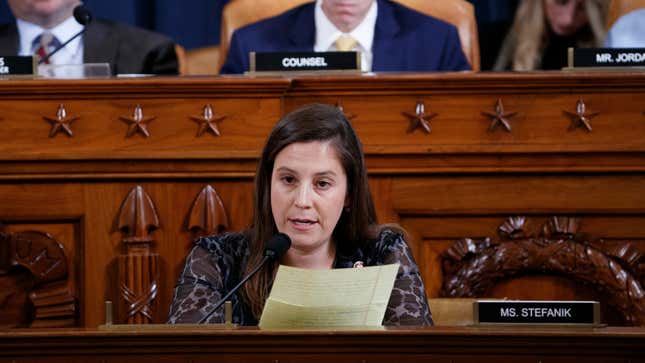This is How a Woman Becomes a 'Republican Star'
Politics

When Republican Elise Stefanik was first elected to Congress in 2014 to represent a district in upstate New York, she became the youngest woman, at the age of 30, to enter the House. A so-called “moderate” Republican who at times voted with Democrats, Stefanik had largely struggled to make a national name for herself—until the impeachment hearings of the past two weeks. But her star rose dramatically during the hearings, in which she made the choice to embrace a full-throated defense of Donald Trump, who in turn praised her as a “new Republican star” citing her combative exchanges with House Intelligence chair Adam Schiff and her bullish push of Republican talking points.
It’s been a remarkable shift for Stefanik who, in the past, has tepidly criticized Trump and voted against his tax cuts, as well as his decision to pull out of the Paris climate change agreement. It’s clear, however, why she made the choice to burnish her reputation by becoming one of Trump’s staunchest defenders. It is, after all, one of the few available avenues to women in the Republican party to succeed on the larger national stage (see Sarah Huckabee Sanders and Kellyanne Conway). Before the impeachment hearings, Stefanik was most noted for trying—and failing—to get more Republican women elected to Congress, against the wishes of the newly elected head of the National Republican Congressional Committee. Electing women, as shallow of a feminist gloss as that is, is clearly a low priority for Republican officials, who are more interested in attacking abortion rights and gutting the social safety net.
But transforming herself into a conservative hero has led to tangible results for Stefanik, even beyond the lavish praise bestowed upon her on social media and in rightwing media. After appearing on Sean Hannity’s Fox News show last week, Stefanik announced she had raised $500,000 for her reelection campaign in just two hours. Stefanik, who desperately wants more women in the party that shows an utter disregard for the lives of most women, has decided that the way to secure her political future is to show that a woman can be just as opportunistic as a man. It’s as cynical as it is ugly—and it’s working.
For conservatives, Stefanik, the only Republican woman on the House Intelligence Committee, has now become a convenient example to illustrate that the Republican Party is, contrary to all evidence, a friend to women. As one Republican aide told Axios, “She’s an attractive young woman that can contrast perfectly against Adam Schiff.” The aide added, “That’s what the Dems do with us: say we’re a party of old white guys, while they trot out AOC as the young face of the party.” Stefanik herself seemed to delight in this role during the hearings, accusing Schiff of silencing her and describing one of her critics, George Conway, as a “misogynist.” This is not surprising—using gender as a defense is the standard playbook for women in Trump’s orbit, meant to mute criticism of bad politics.
Stefanik is far from the only Republican who has hitched their political career and future to Trump. But she, in particular, may come to regret it. Her district voted for Trump in 2016 but had favored Barack Obama in both 2008 and 2012. Her 2020 opponent Tedra Cobb, who ran against Stefanik in 2018, raised more than $1 million after the first week of impeachment hearings, largely based on opposition to Stefanik’s newfound love for Trump. A local newspaper, which endorsed her in 2016, is now raising the alarm bells. “It’s not too late for her to choose honesty and honor. But we fear that won’t happen, because she has been going the opposite way, becoming more partisan, more disingenuous and irrational,” the editorial board of the Post Star wrote, noting that Stefanik “will differ with Trump’s policies here and there” but that largely, she’s become a “loyal mouthpiece for Trump’s talking points.”
In a recent profile written by former House Speaker Paul Ryan, whom Stefanik used to work for before she joined Congress, Ryan praised her for her “authentic, respected voice” and called her the “future of the Republican Party.” Ryan is right, but not for the reasons he thinks. It’s Trump’s party now, and the Stefanik that emerged during the impeachment hearings is its future.